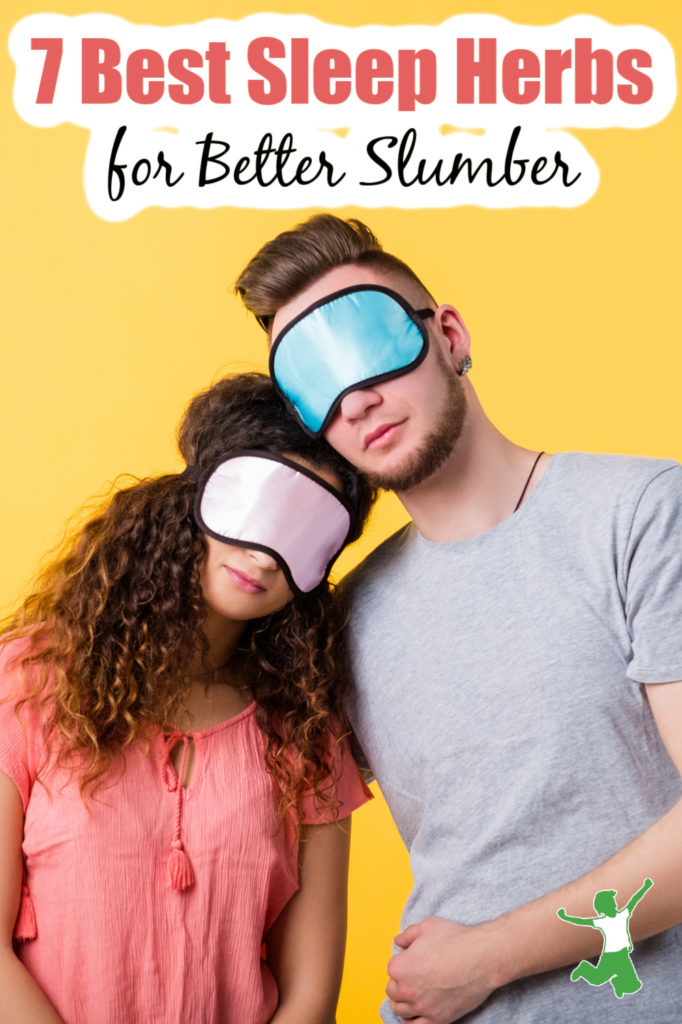Best seven herbs to facilitate the deepest night’s sleep to avoid addiction issues with sleep meds or melatonin.

As the anecdotal stories and scientific research on the dangers of pharmaceutical sleep aids continue to grow, people are increasingly turning to herbs as an aid for natural relief from insomnia and to improve the quality of their slumber.
Who can forget Oscar-winning actor Jack Nicholson’s stern warning about the sleep drug Ambien:
I don’t take sleeping pills but somebody said ‘take this [Ambien], it’s mild.’
I got a call in the middle of the night, kind of an emergency, and I almost drove off a cliff 50 yards from my house, and I live up in the mountains in Aspen. So I warn people about it [Ambien]. (1)
What About Melatonin?
Melatonin products have become wildly popular in recent years. I know people who literally give their kids a melatonin gummy every single night to get them to bed on time.
While melatonin is natural and definitely works, I always suggest to people to avoid it just the same as sleep meds.
The reason is that melatonin can become quite addictive to the point where the body can have a difficult time producing sufficient levels of neurotransmitters to facilitate sleep on its own.
This means that getting off melatonin could prove a real struggle after a prolonged period of use.
While melatonin every now and then when you travel across time zones is fine, take heed to not make it a regular habit.
Herbs are the Best Method for Improving Sleep
Using herbs to improve the quality, depth, and duration of sleep makes sense because this type of approach is considerably safer and more time-tested than drug-based sleep aids.
In addition, sleep-promoting herbs are safe for most children and are preferable to using hormones like melatonin that can disrupt the body clock long-term.
I’ve written before about how I use herbs to help me sleep occasionally when I travel.
I live in a semi-rural area with little to no EMFs, so staying in hotels in major cities with very strong WiFi signals can sometimes make my sleep very shallow. While staying in midtown Manhattan on one particular trip, my computer picked up over 100 WiFi signals from my hotel room on the 4th floor!
At those times, I find using a melatonin-free sleep aid invaluable to help me temporarily adjust.
Top 7 Sleep Herbs to Try
Not all sleep herbs are created equal! Some might tend to give you crazy dreams while others will simply relax you enough to drift off more quickly.
Also, note that not all sleep herbs are appropriate for children!
They also should be of sufficient potency to ensure effectiveness. A box of chamomile tea that’s been sitting in your tea drawer for several years is probably not going to help much! This article details how to properly care for and store dried herbs and teas.
Assuming freshness and potency, the following herbs work wonderfully well for resolving temporary issues with sleeplessness.
Chamomile (Camomile)
Chamomile, Chamaemelum Nobile, is probably the best-known sleep herb to try for occasional insomnia issues. It is very safe for both adults and children. This gentle herb is also helpful for irritability and digestive upset, which is helpful to know since both conditions could easily lead to a sleepless night if left unresolved!
Back in my twenties when I had issues with panic attacks from my crazy corporate lifestyle, I used to carry chamomile tea bags in my purse to literally sniff if I felt an episode coming on and didn’t have access to hot water to make tea. The aroma of chamomile worked very well for this purpose!
The most potent way to use chamomile is as an herbal infusion. Place one ounce of dried herb in a one-quart mason jar and fill to the top with boiling water. Screw on the lid and leave at room temperature for 4 hours.
However, a quickly brewed cup will help in a pinch if it is 2 am and you need help immediately.
Another very easy method is to use a chamomile tincture. This is probably easiest for children too. Thirty drops mixed with a bit of water and then swallowed is the typical dosage. However, always follow the directions on the label of the brand you use.
Passionflower
I’ve always thought it interesting that an herb named Passion Flower can actually help you sleep!
Passionflower, Passiflora incarnata, is a very mild sleep herb best used when the sleep issues are from overwork, anxiety, or exhaustion.
I use this blended sleep herb capsule that contains passionflower, reishi mushroom, magnesium, and L-Theanine when I travel and on nights when my sleep schedule is unexpectedly disrupted. It works fabulously well.
If using passionflower alone, the recommended dosage per Michael Traub, ND who has studied Passion Flower in depth is as follows (2):
- Herbal infusion: 2 g in 5 oz/ 150 ml water, three to four times daily.
- Capsules: 2 capsules, three to four times daily.
- Tincture: .3 oz/ 10 ml, three to four times daily.
Lavender
Lavender, Lavandula angustifolia, is a flowering herb in the mint family. The essential oil from this plant is commonly used for aromatherapy to stimulate relaxation and drowsiness via the sense of smell.
Lavender essential oil can be effectively used as massage oil (10 drops mixed with an ounce of olive oil). A few drops can also be added to the bath before bedtime to promote sleep. Some people like to even put a drop or two on their pillowcases. Just be sure that the pillowcase covers a nontoxic pillow or the efforts may be futile!
Lavender oil should not be taken orally. Care should also be taken when using it topically with young boys on a frequent basis. A study published in the New England Journal of Medicine suggests that repeated topical use of products containing lavender oil may cause gynecomastia, a rare condition in males resulting in enlarged breast tissue. (3)
Kava
Kava, Piper methysticum, is an effective sleep herb when nighttime restlessness is from stress or nervousness. Indigenous to Fiji and surrounding islands in the South Pacific, kava is commonly used to prepare a traditional beverage used for relaxation and to enhance dreaming.
Although safe in small dosages, the FDA has issued a public safety alert about kava. (4)
In addition, Germany, Switzerland, and Canada banned products containing kava because of the risk of liver injury.
As a result, the safest way to enjoy the benefits of kava is as a mild tea rather than an herbal supplement.
California Poppy
I’ve never used the California poppy, Eschscholzia californica, but for many, it is their favorite sleep herb.
Clinical and laboratory work on the California poppy has demonstrated its ability to reduce the time required to fall asleep along with improving sleep quality. The scientific information available on this herb agrees with its traditional use. (5)
The best way to use the California poppy is as a tincture. Use as directed, which for a tincture, is typically 30 drops 2-3 times per day.
Hops
Best known as a flavoring component of beer hops (Humulus lupulu) actually has a very long history as a sedative too. King George III of England and Abraham Lincoln reportedly used pillows filled with hops to enhance their sleep.
While using a hops sleep pillow is one way to use this herb to improve slumber, spraying your pillowcase with a hops-based pillow potion, using a tincture, or sipping hops tea is probably more convenient and less scratchy!
Hops tincture should be used as directed on the bottle which is typically 30 drops in a small bit of water 2-3x per day. A cup of hops tea can be sipped in the morning and again in the evening to promote sleep that night.
Valerian
Valerian, Valeriana officinalis, is possibly the most powerful of the herbal sedatives. It helps in situations where people have a hard time falling asleep. In addition, using valerian before bed reduces nighttime waking.
Some people find that they experience really crazy dreams when using valerian. If you’ve never used it before, start with very small amounts! Valerian works well in combination with other sleep herbs, particularly hops.
Other Tips for Better Slumber Using Herbs
Please note that sleep-based herbs are for occasional use only.
If you need a suggested brand, I’ve been using this blended sleep herb capsule with great results.
For those that are pregnant or nursing, consult with your practitioner before using any herbs to promote sleep.
If you have chronic issues with insomnia or nighttime waking, it could be from hormonal issues or other health problems that need to be addressed by a physician.
Also, note that investing in a nontoxic mattress brand is very important. This ensures a healthy sleep environment and the deepest, most healing slumber.
Have you ever used herbs as an occasional sleep aid? If so, which did you use and how did they work for you?









The link for the Passion flower capsule with reishi and L-Theanine doesn’t work. What is the name of the capsule? Thanks!
Mmmm. That’s odd. It’s working for me. It’s called Sleep Support. https://www.thehealthyhomeeconomist.com/go/sleep-support/
Homeopathy trumps them all when it comes to insomnia.
It’s never worked well for me, unfortunately 🙁
Homeopathy was my cure for life long trouble falling asleep. It also helps for the occasional night when I wake up and can’t go back to sleep.
What did you use ?
I have found castor oil pack treatments to the upper abdomen a few hours before bed, has nearly always led to a good night’s sleep. If I use them three days in a row, I can sometimes coast for a week of deeper, restorative sleep.
Thanks for the tips and knowledge to help with the sleep issues! Plenty of options to try moving forward!